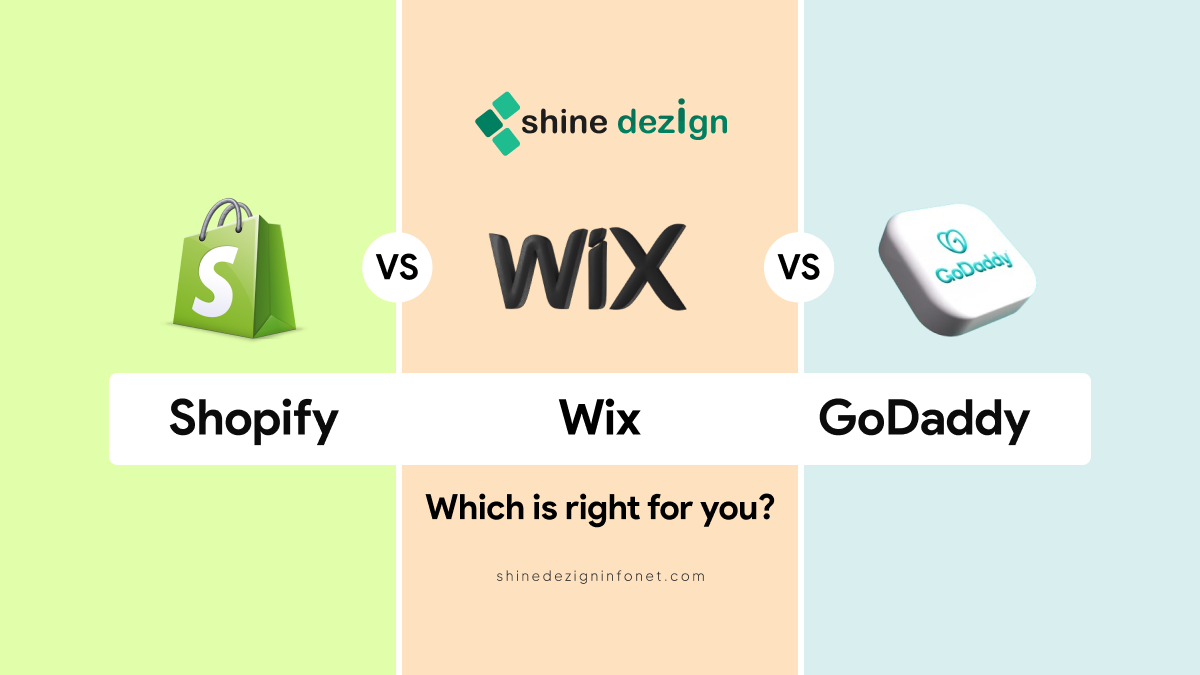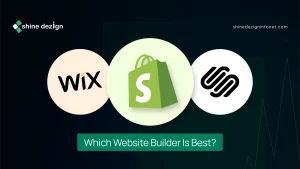Table of Contents
Ultimately, Shopify, Wix, and GoDaddy do great work when it comes to creating websites. But when is the best platform for you? Confused about the best ones and selecting one. Don't worry; we have got you covered. This blog will help you choose the best platform for your business. We will explore Shopify vs Wix vs GoDaddy and compare them depending on their features, functionality, and performance.
Understanding Wix
Wix is a free, user-friendly website-building platform with built-in functions and features. It lets you quickly develop and design professional websites that look stunning on your device.
Wix gears its tools and platform toward absolute beginners. Its user-friendly editor and versatile templates make it easy for entrepreneurs, individuals, and small businesses to launch and create professional websites.
Why Choose Wix?

User-friendly Interface
The Wix platform has a user-friendly interface and helps you develop and create a website by suggesting relevant pages, features, and templates using a simple questionnaire. The drag-and-drop site editor can also turn anyone into an expert web designer without writing a single line of code.
Wide range of design templates
Wix comes with a range of design templates and allows you to explore hundreds of pre-made templates. From trendy to timeless, every aesthetic has a thoughtful Wix template.
Powerful Seo tools
Wix helps clients find your website by utilizing its built-in SEO features. Wix websites are also optimized for search engines, making it even more seamless for your page to rank.
Flexibility and customization
By selecting a business or eCommerce plan, you can get more access to robust features for your online store. Also, you can accept and manage online payments, oversee your inventory, and even integrate your sales with different platforms like social media.
Pros and Cons of Wix
Pros
If you are looking for stunning, top-notch website design, you may like that Wix offers a wide range of pre-made templates.
Wix has customization options that allow you to change practically every aspect of your site, including the text, images, and layouts.
- It provides SEO support and various in-house solutions to help and guide online retailers to increase their visibility and grow sales.
- Developing your website through Wix gives you access to many other valuable options.
Cons
- Wix offers customization capabilities but with restrictions.
- If you transfer your website from Wix to another platform, you must build it entirely from scratch.
- If any third-party app doesn't have a relation with Wix.
- Also, it gives limited monetization options.
Understanding Shopify
Shopify is subscription-based software that enables users to easily design and develop an online store to sell their products. It has more than 5.6 million websites and helps anyone launch their dream business online and start selling around the globe.
Anyone can utilize Shopify to become an eCommerce seller. Shopify can do everything if you need to set up a simple store or deliver an exceptional shopping experience. It is designed to be versatile and grow with you.
Why choose Shopify?
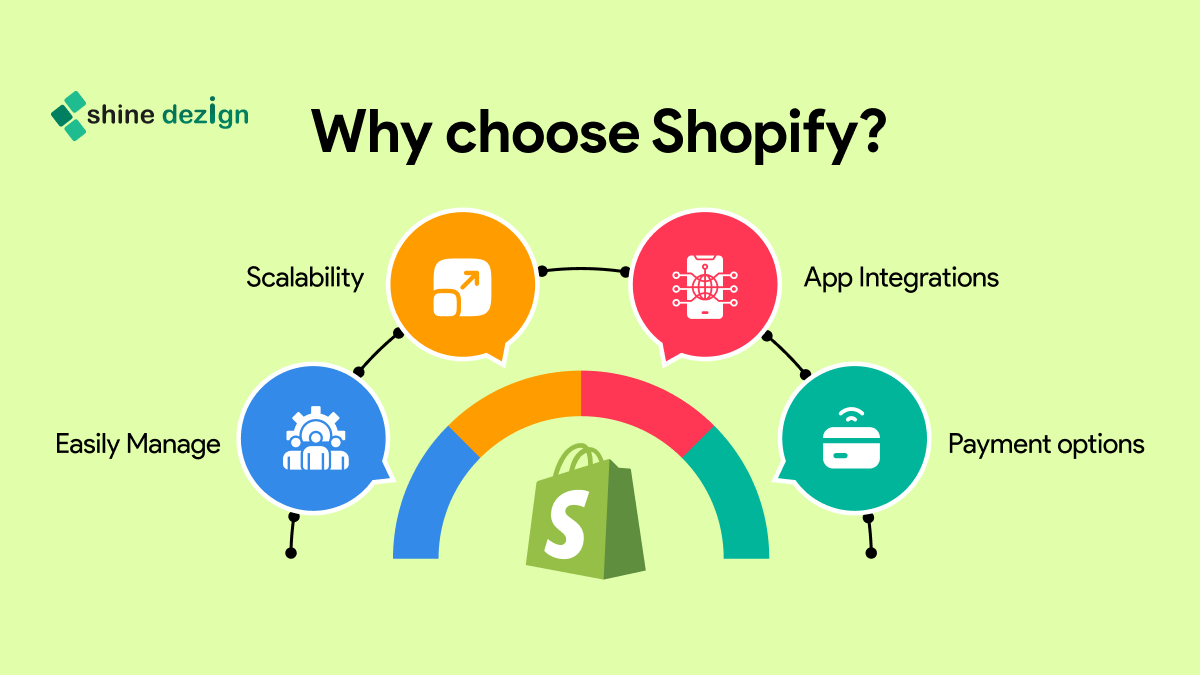
1. Easily Manage
Shopify is a user-friendly and easy-to-manage website that remains effortless to use, one of the platform's biggest draws for online merchants. The dashboard quickly displays the most relevant features, such as orders, goods, client information, reports, applications, and more. Adding items, controlling settings, and processing orders can all be done withing a single click.
2. Scalability
Shopify is a top-rated scalable platform, which is vital. You should also have a long-term strategy when deciding whether the platform will help your business as it grows. It should also offer functionalities and features that are personalized and flexible, enabling you to create and develop your company more effortlessly.
3. Shopify App Integrations
Shopify is renowned for its robust app marketplace and simplicity of integration with other platforms. Also, its marketplace includes 1500 Shopify apps tested and reviewed by Shopify, so you can be sure that you can trust them to make your online stores seamless.
4. Payment options
Shopify has appealing features for brands with repeated corporate clients to streamline the checkout and Shopping experience.
In addition, it allows clients to save their delivery and credit card details to make future checkouts even more accessible.
Pros and Cons of Shopify
Pros
-One of Shopify's robust benefits is its user-friendly and easy-to-use interface.
-Shopify boasts a highly reliable 24/7 support team that is always ready to assist you, no matter the time of day, ensuring you never feel alone in your e-commerce journey.
- Shopify now has various payment options that include third-party platforms
- Shopify has a variety of Shopify themes that determine the appearance of your online store.
Cons
- The Shopify platform may be a bit costlier than other platforms.
- Many businesses need help in content marketing.
- You may face limitations in theme customization.
-Also, it does not support email hosting
Understanding GoDaddy
GoDaddy is another web hosting and domain registration company that offers various services for businesses and individuals looking to establish an online presence, including website hosting, website builder tools, SSL certificates, and email hosting.
Why choose GoDaddy?
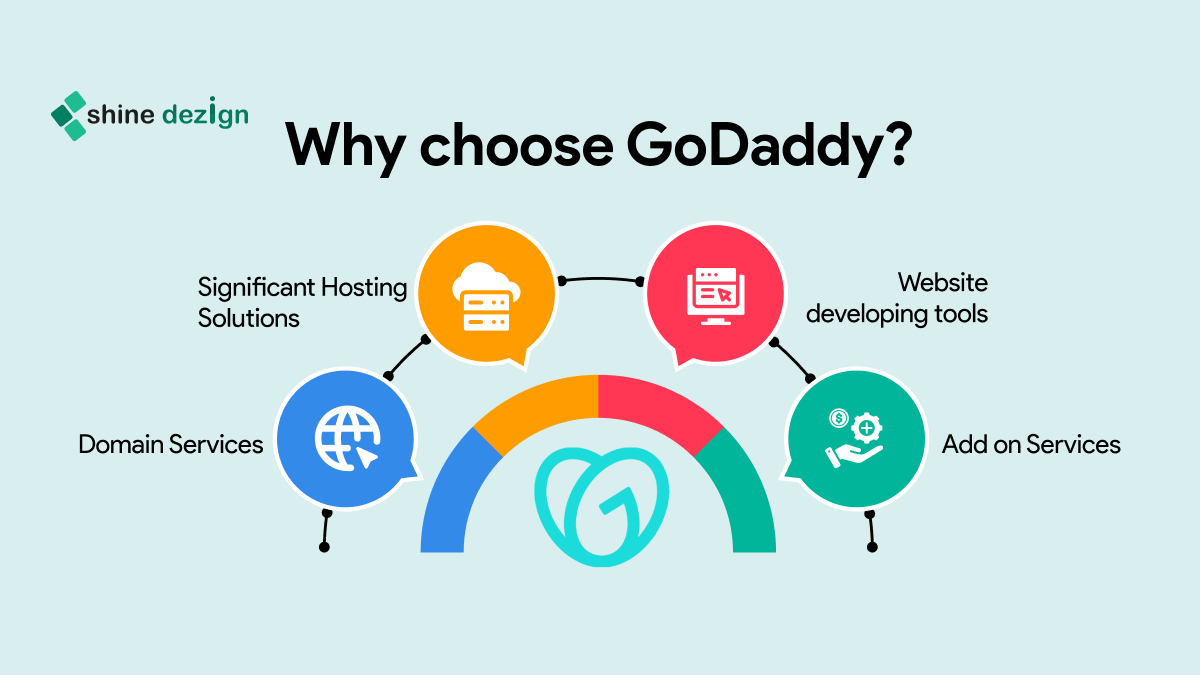
Domain Services
GoDaddy is among the largest domain registrars, providing various domain name options. Also, it offers robust tools for managing domain names, including bulk domain transfer, registration, and auction services.
Significant Hosting Solutions
GoDaddy offers numerous hosting plans that incorporate Shared, VPS, and dedicated hosting, catering to different budgets and requirements. It also provides managed WordPress hosting options that help maintain security and maintenance.
Website developing tools
Godaddy offers website development tools that enable users to develop and create professional-looking websites without requiring extensive technical knowledge. It comes with various customizable themes and templates that help users quickly design appealing websites.
Add on Services
GoDaddy provides professional email hosting with custom domain names. It also provides an SSL certificate to ensure secure transactions on your website. Moreover, GoDaddy offers SEO tools for social media management and email marketing to attract engagement and traffic.
Pros and Cons of GoDaddy
Pros
-Easy Drag and Drop interface allows anyone to get started easily.
- Offers a variety of professionally designed templates.
-Also, its Website Builder plans are very affordable.
- Offers hosting plans that can scale with the growth of a business.
Cons
-It has the additional cost of many features like specific security tools and backups.
- users on shared hosting plans may experience slower performance during peak times due to the shared resources.
- Support is available 24/7, and it can vary, with some users reporting unsatisfactory experiences.
Comparing Shopify vs Wix vs GoDaddy
Shopify Vs GoDaddy
The primary distinction lies in their core focus when comparing Shopify vs GoDaddy. Shopify is specifically developed for e-commerce, offering an exclusive set of tools to manage and grow an online store.
It excels with its extensive app store, allowing users to add functionalities like advanced inventory management, customer relationship management, and marketing tools. In the Shopify vs GoDaddy ecommerce comparison, Shopify clearly stands out for businesses focused on online selling, thanks to its tailored solutions for eCommerce growth.
On the other hand, Godaddy is a web service provider that offers various hosting plans, domain registrations, and a website builder. It doesn't include eCommerce capabilities, and the ones it does include are more basic than Shopify's.
Shopify Vs Wix
Speaking about Shopify vs Wix, Wix is popular for its easy-to-use website builder and flexibility in serving a wide range of website types, from blogs and portfolios to small business sites. Also, Wix comes with a drag-and-drop interface, making it more accessible to users with no coding knowledge.
Shopify, on the other hand, focuses on eCommerce and incorporates an app store that enables you to customize as per your need, making it suitable for organizations aiming to scale their online sale. In the Shopify vs Wix ecommerce space, Shopify provides stronger SEO and marketing tools that help boost traffic and conversions for online stores. Moreover, Shopify also provides strong SEO and marketing tools that help to gain traffic and conversions.
Wix vs GoDaddy
Wix and Godaddy provide website building and hosting services but have different strengths. Wix's intuitive drag-and-drop website builder enables users to create visually appealing websites easily.
GoDaddy offers a comprehensive web services suite that includes a website builder, hosting, and domain. Its website builder is easier to use than Wix's, making it suitable for beginners or those needing a simple, straightforward website.
Comparison Table: Shopify vs Wix vs Godaddy
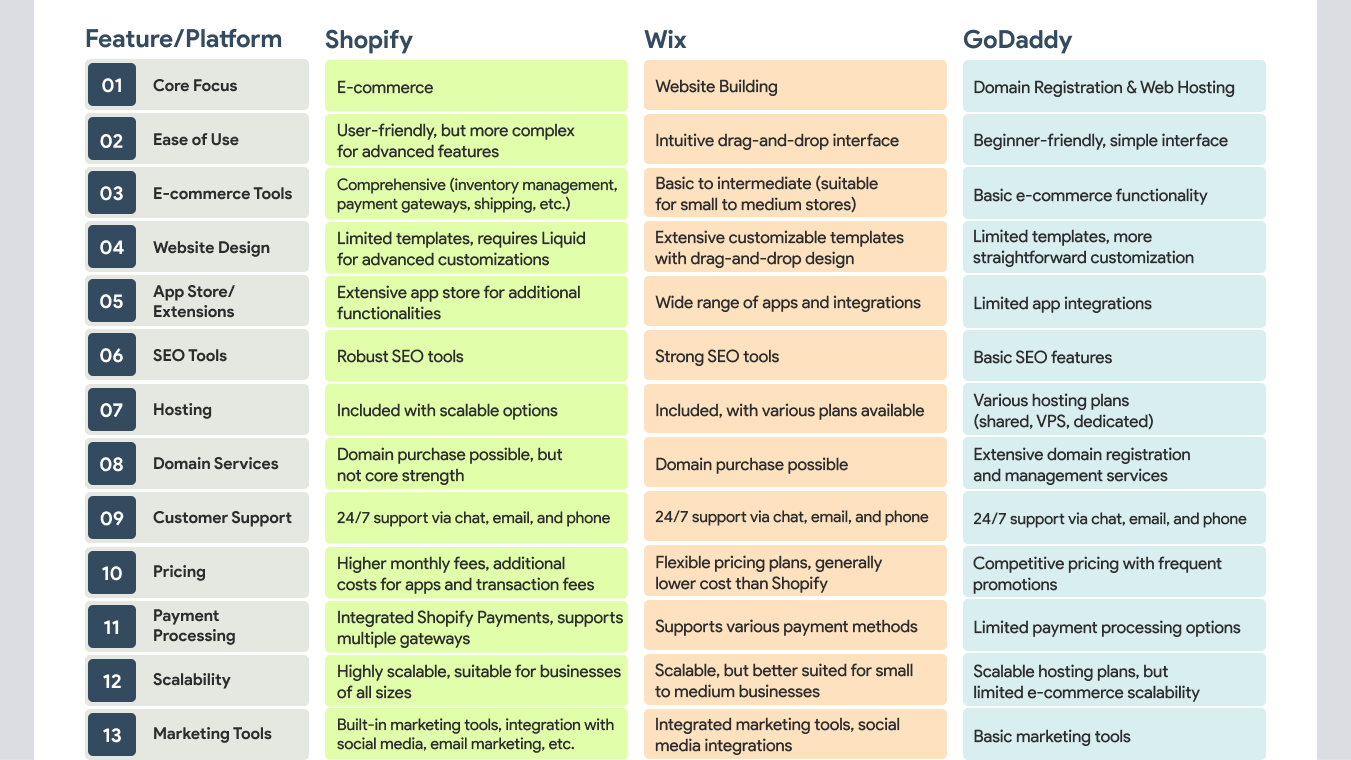
Why do Users Prefer Shopify over GoDaddy and Wix?
E-commerce Focus
Shopify is designed specifically for e-commerce, providing robust tools for product management, inventory tracking, shipping, and payment processing. It supports a wide range of payment gateways and offers built-in analytics to monitor sales performance.
Ease of Use
Shopify has a large app store with thousands of third-party apps that can extend the functionality of your store. These apps cover a wide range of needs, from marketing and Shopify SEO to customer service and logistics.
Design and Customization
Shopify offers a wide range of professional, mobile-responsive themes that can be easily customized to match the brand’s aesthetic.Also,Users can customize their stores using Shopify’s Liquid template language, which offers more flexibility for advanced users who need custom solutions.
Security and Reliability
Shopify takes care of the security of its platform, ensuring that all stores are PCI compliant and offer SSL certificates for secure transactions. Also, it provides reliable hosting with high uptime and fast load times, ensuring that stores remain accessible and performant for customers.
Multichannel Selling
Shopify enables users to sell not only for their online store but also on other platforms like Instagram, Facebook, Amazon and eBay. Also, this multichannel selling ability is vital for reaching a broader audience.
Summing Up
Ultimately, the choice between these platforms depends on the specific needs and goals of the user. For dedicated e-commerce ventures aiming for growth and advanced functionality, Shopify is the superior choice. For those prioritizing ease of use, website customization, or integrated domain services, Wix or GoDaddy may be more suitable.


